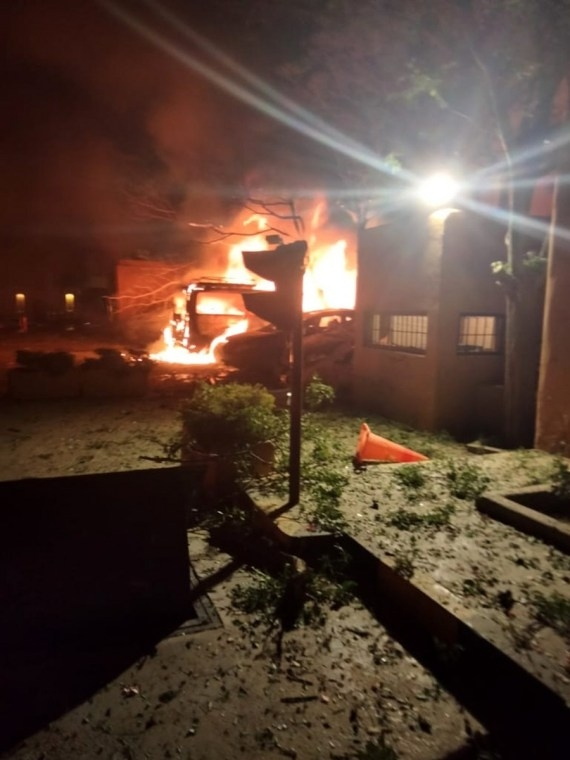

This is the first major direct attack carried out by the Pakistani Taliban after the recent unification of its various breakaway factions. It appears to be posing a major threat to China’s ambitious China-Pakistan Economic Corridor (CPEC)
<p>
<strong>Balochistan was once again rocked by a deadly blast in the car park of the Serena, a luxury hotel chain of Pakistan, in the city of Quetta, the capital of Balochistan province where the military has been fighting a decade long insurgency.</strong></p>
<p>
&quot;At least four people have been killed and 12 others were injured,&quot; Pakistan&#39;s interior minister Sheikh Rashid Ahmed told the media, &quot;A Chinese delegation of around four people led by the ambassador was lodging in the hotel. The Chinese ambassador Nong Rong was out for a meeting when the explosion took place,&quot; he added, that this is one of the safest areas of Quetta, foreigners also stay in the same hotel.&nbsp;</p>
<p>
Balochistan Home Minister Ziaullah Langove said: &nbsp;&quot;He (the Chinese envoy) is in Quetta. I just met him… he is in high spirits and would continue his activities,&quot; he added.</p>
<p>
The banned Tehreek-e-Taliban Pakistan (TTP) has claimed responsibility for the Serena hotel blast. A spokesman for the TTP said, &ldquo;Our suicide bomber used his explosive filled car in the hotel.&quot;</p>
<p>
This is the first major direct attack carried out by the Pakistani Taliban after the recent unification of its various breakaway factions. It appears to be posing a major threat to China&rsquo;s ambitious China-Pakistan Economic Corridor (CPEC). The Serena attack has put China in a tight spot, given that the Chinese were pressing Pakistan to crack down on ethnic separatist groups in Balochistan and Sindh to protect CPEC. CPEC is the flagship of China&rsquo;s ambitious Belt and Road Initiative (BRI), Beijing&rsquo;s grand connectivity plan for Eurasia. Starting from the port of Gwadar in the south and Kashgar in the north, CPEC is the gateway to China&rsquo;s access to the Indian Ocean.</p>
<p>
The TTP is now regularly threatening the Chinese state, citing the worsening situation of Muslim communities in China, including in Xinjiang&mdash;home to a large number of Uyghur Muslims, who have featured prominently on the globe&rsquo;s human rights radar&mdash;as the cause of their angst. &nbsp;</p>
<p>
<span style="font-size:16px;"><strong>ALSO READ: <a href="https://www.indianarrative.com/world-news/islamist-revolt-rocks-imran-khan-government-81488.html">Islamist revolt rocks Imran Khan government</a></strong></span></p>
<p>
Relenting to Chinese pressure, Pakistan had banned three terror groups linked to al-Qaeda, the East Turkestan Islamic Movement, the Islamic Movement of Uzbekistan, and the Islamic Jihad Union eight years ago. Beijing believed these groups had established sanctuaries in tribal areas of Pakistan with the assistance of TTP, where several Chinese nationals had been killed.</p>
<p>
In fact, China has been facing double threats in the region. The other security concern is posed by Baloch nationalist organisations.</p>
<p>
With an estimated $1 trillion in natural resources, Balochistan stands at the canter of the CPEC. Under CPEC agreement, Gwadar is slated to be leased to China for around 40 years, to modernize the port. China plans to develop Gwadar as a special economic zone, similar to Hong Kong and Macau. For China, Gwadar could drastically shorten the time it takes to trade with Europe, West Asia, and Africa.</p>
<p>
When the CPEC agreement was announced in 2015, Baloch nationalists were quick to accuse Islamabad of side-lining their interests in favour of Chinese investment and selling out Balochistan&rsquo;s immense natural wealth without consulting them. Since then, Balochistan Liberation Army (BLA) attacks have largely been focused on Chinese interests. Several deadly attacks on Chinese workers and engineers have taken place since May 2017, which according to BLA spokesman Jeeyand Baloch, are part of the &ldquo;BLA&rsquo;s policy of not allowing any force, including China, to plunder the Baloch wealth in Balochistan.&rdquo;&nbsp; The attacks include a November 2018 attack on the Chinese Consulate of Karachi and the May 2019 attack on the luxury Pearl Continental Hotel in Gwadar. Other significant insurgents targeted the Pakistan Stock Exchange, which is partly owned by Chinese companies.</p>
<p>
Following the Serena hotel attack, the question is whether the TPP and Baloch nationalists have bonded against the two so-called iron brothers&mdash;Pakistan and China?</p>
Political activist from Pakistan-occupied Jammu Kashmir (PoJK), Amjad Ayub Mirza, has condemned China's involvement in…
Bhutan Prime Minister Tshering Tobgay has said that he considers Prime Minister Narendra Modi as…
Prime Minister Narendra Modi met the Chief Advisor of the government of Bangladesh, Muhammad Yunus…
The Cabinet Committee on Economic Affairs, chaired by the Prime Minister Narendra Modi, has approved…
Prime Minister Narendra Modi on Friday met with Bangladesh's chief advisor Muhammad Yunus for the…
Ambassador of India to Myanmar, Abhay Thakur said on Friday that under Prime Minister Narendra…